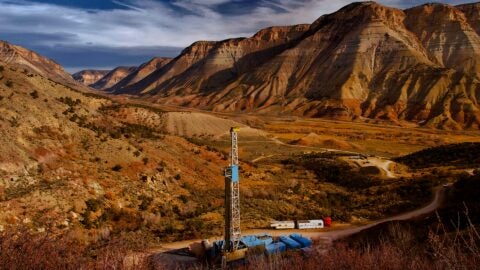Trump wants to reduce waste and grow jobs? Good, these methane policies do just that.
This post originally appeared on the EDF Voices blog.
Today, lawmakers are using the Congressional Review Act to dismantle common-sense energy policies that can save Americans hundreds of millions of dollars and prevent massive amounts of energy resources from being needlessly wasted.
The targeted policies from the Bureau of Land Management apply to oil and gas companies that operate on 245 million acres of federal and tribal lands. Since 2013, these operators have wasted more than $1.5 billion worth of natural gas that belongs to the American public, with millions in lost royalties as a result.
That comes to more than $1 million every day – hardly what President Trump had in mind when he promised to maximize our natural resources.
Trump also famously campaigned against the “rigged system.” But dismantling policies that prevent private companies from wasting American resources rigs the system in favor of industry and against taxpayers.
Which begs the question, why would Congress take an action that affects our economy and flies in the face of the Trump administration’s explicit goals?
“We’re wasting energy and that is troubling”
Oil and gas operations on public lands cost taxpayers $600 million between 2005 and 2015, according to one report.
Rep. Ryan Zinke of Montana, President Trump’s pick to lead the U.S. Department of the Interior, has called this waste “troubling.” But even more more troubling is the fact that his Republican colleagues in Congress are moving to jettison the BLM natural gas waste rule that would directly benefit their constituents.
Rolling back BLM’s standards will now cost taxpayers [PDF] an additional $800 million in lost royalties over the next decade – money that would be welcome in many states across the West that today face budget shortfalls.
Methane rules have bipartisan support
Dismantling BLM’s policies run counter to the Trump administration’s own energy goals. According to the president’s energy plan, Trump plans to boost American energy production and to use the revenue to fund public infrastructure improvement projects.
BLM’s policies accomplish exactly this. It also explains why the policies have received bipartisan support from conservationists and fiscal conservatives, along with more than 80 percent of Westerners.
So who’s really against the BLM rules? Follow the money.
Oil lobby spent $118 million to fight rules
Last year, oil and gas companies reportedly spent $118 million lobbying against policies that protect the public from unintended consequences from energy development. In fact, the polluter lobby filed a lawsuit against BLM within 30 minutes of the policies being finalized, arguing that regulations are unnecessary as the industry is naturally incentivized not to waste product.
But the massive amount of gas currently being wasted tells a different story, not to mention the fact that the problem can easily be rectified given the affordable and proven technologies on the market today to stop this waste.
Some jurisdictions such as Colorado already require companies to address natural gas waste and operators there say these policies haven’t hurt their bottom line. They’ve also created new jobs: There are already 500 companies that develop, manufacture and sell methane control technologies in the U.S. today.
Using the Congressional Review Act to rescind BLM’s energy policies runs in direct opposition to the very ideals that Republican leaders claim to support. It’s a blunt, misplaced effort that undermines American taxpayers, threatens our energy security and causes irreparable damage to the environment.













